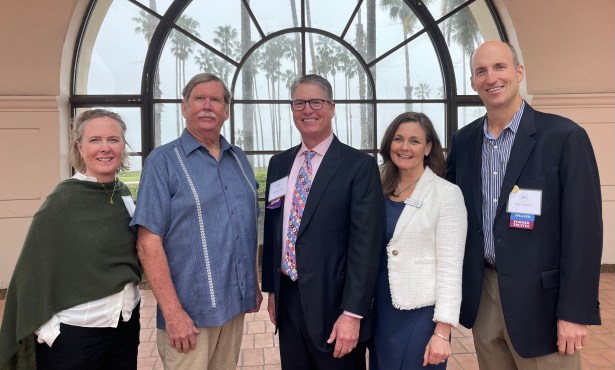UCSB Gets a New Corwin Professor
Clarence Barlow Leads the Civilized Avant-Garde
by Gerald Carpenter
After Bill Kraft retired as Corwin professor of composition at
UCSB, the university conducted a search for “a composer of
international stature who will be an effective educator and play a
leadership role in our composition program. Of particular interest
are candidates with interdisciplinary interests in the arts,
humanities, sciences, or engineering, and who will thrive in a
department with strengths in traditional composition,
electro-acoustic and computer music, performance, musicology,
ethnomusicology, and music theory.” On these grounds, the search
committee hired Professor Clarence Barlow. Of European descent,
Professor Barlow was born and raised in Calcutta and has degrees
from the University of Calcutta and the Trinity College of Music in
London. He has studied electronic music at the Musikhochschule Köln
(Cologne), where he studied composition with Bernd Alois Zimmermann
and Karlheinz Stockhausen. Breathtakingly accomplished, Barlow
began composing when he was 11. When I interviewed him, he was in
Europe, supervising a big computer music festival, of which he was
initiator and curator.
 The great bulk of what I have read about
The great bulk of what I have read about
your music — almost all of it approving — makes no attempt to deal
with it emotionally, preferring instead to explore and extol your
technical mastery and ingenuity. How do you plan to inspire your
students to touch the hearts of their listeners? A technical
description of music, relying as it does, more or less, on accepted
definitions, is usually less challenging than an aesthetic one,
particularly due to the near impossibility of effectively
anticipating the taste and experience of potential readers. A
worthwhile description, on an emotional level, presumes a clear
awareness of the recipients’ collective psyche. On the prescriptive
level, however, the composer must consciously investigate to what
extent the music — while possibly founded on one or another
technique — can engender feelings sensed by a reasonably large
section of the public. After all, a composer has the choice to
allow fantasy and creativity to run an unbridled course at the risk
of opening up uncharted territory, or, to keep in view the
listeners’ ability to assimilate, perhaps by remaining on safe and
well-trodden paths. For some this poses a conflict, but for others,
it is one of the facets of culture. Some would follow the path of
John Cage, others that of Philip Glass. I hope to help make my UCSB
students aware of this choice and to weigh their responsibility
therein.
You were quite young when you began to compose. What composers
and compositions made you want to write music? As a young boy, I
played the piano in the school orchestra. The music featured was by
composers like Franz von Suppé and Ambroise Thomas and it triggered
enormous emulous energies in me. Furthermore, at age 11, I was in,
albeit short-lived, training to be an organist, so the standard
church organ literature provided the inspiration there. Somewhat
later, thanks to the local symphony orchestra, composers like
Haydn, Mozart, and Beethoven entered my scene, followed, on the one
hand, by composers from Bach back to Perotin, and, on the other, by
Brahms, Tchaikovsky, Rachmaninoff, Sibelius, Prokofiev, Hindemith,
Bartók, Schönberg, Webern, Stockhausen, Cage, and others. As an
example of actual works, let me single out Brahms’s 4th Symphony,
Sibelius’s 7th Symphony, and Bartók’s 4th String Quartet.
Is there a possibility, in your view, that the boundless
availability of music on the Web will have the ultimate effect of
diluting and devaluing it? A great and extensive library, which the
Internet provides, cannot dilute or devalue its contents by sheer
virtue of its size. Rather, those who seek or have access to this
library must learn to discern between the different types of
information available and to process this information in sufficient
depth. Those who manifest a more superficial approach would
probably do so even with a much smaller supply of knowledge
available to them. Teachers can be of help here in pointing out
interesting sources and most of all in thoroughly discussing
matters of content.
I think Schönberg demonstrated the limitations of the
theoretical approach to composition. Do you think music must stay
connected to folk culture? There have always been composers of
value who chose to extensively base their work on more or less
creative theoretical research, and there have always been composers
who sought to reach the general public by the employment of
recognizable and consumable artifacts such as those from folk
culture. In this, music shows a relation to science and to
entertainment, which is not to say that science cannot be
entertaining or that entertainment is necessarily devoid of a
scientific foundation. … Music should simply be good, without
having its scope limited.



